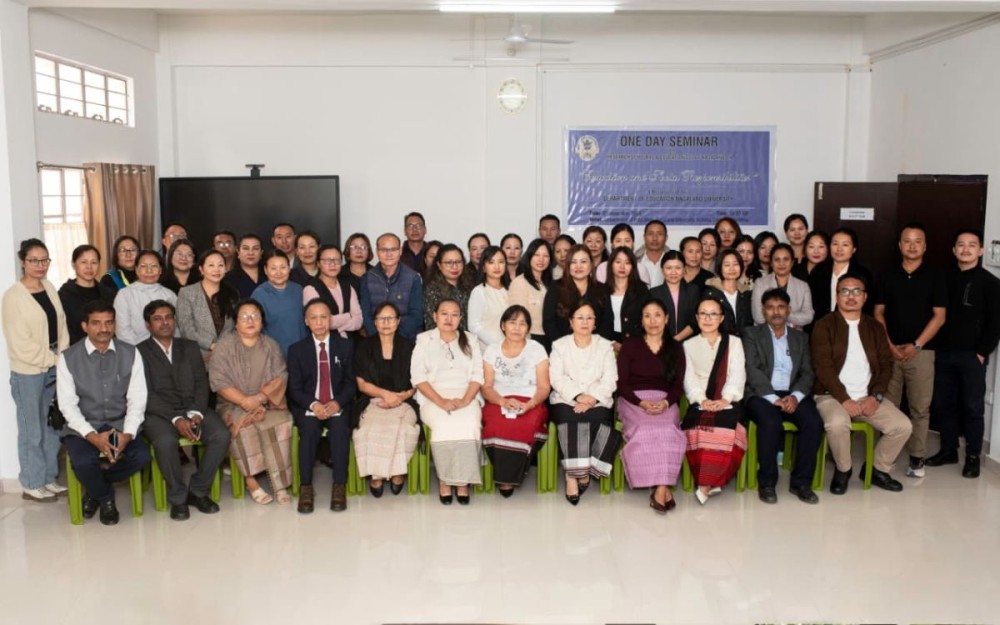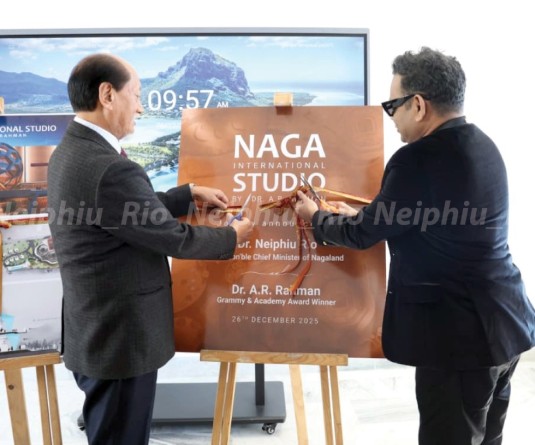Scholars and educationists from across Nagaland and other states during the one-day seminar on “Education and Social Responsibilities,” organised by the Department of Education at Nagaland University on November 6.

KOHIMA, November 8 (MExN): A one-day seminar on “Education and Social Responsibilities,” organized by the Department of Education at Nagaland University, was conducted on November 6, bringing together 95 research scholars and educationists from across Nagaland and other states.
In her opening remarks, the Head of the Department, Prof Lungsang Zeliang, framed the seminar’s conceptualization as a vital reminder of education’s intrinsic link to society, stated an update received here. She stated that the event aimed to help stakeholders understand the evolving landscape of higher education under the National Education Policy (NEP) 2020. Prof Zeliang expressed pride in the achievements of the department’s alumni and underscored the critical role of teachers in moulding students into responsible citizens who contribute meaningfully and “give back to society.”
Addressing the inaugural session as the keynote speaker, Dr Zavise Rume, Director of the International University, Nagaland, emphasised the urgent need to build a “knowledge society” through targeted academic programmes. He advocated for the integration of indigenous Naga ethos and practices into the modern educational framework. “The ethos of Naga practices can be utilized,” Dr Rume said, commending the involvement of local community leaders, artisans, and experts. He asserted that indigenous knowledge and modern technologies can not only co-exist but also mutually strengthen one another.
NEP 2020 and structure of education
In the first technical session, Prof Buno Liegise as the resource person delved into the theme “Education and Social Responsibilities.” She explored the root meaning of education and provided a gestalt, bird’s-eye view of education policies.
Prof Liegise detailed the features of NEP 2020, which seeks to make higher education “multidisciplinary, holistic, transformative, and futuristic.” She informed the gathering that Nagaland University has taken early initiatives for NEP 2020 implementation, including the introduction of multidisciplinary education, the Four-Year Undergraduate Programme (FYUGP), and vocational courses.
Defining social responsibility, she described it as the duty of individuals and entities to act for the benefit of their environment and society. Prof. Liegise called upon all participants to become “brand ambassadors of their education” by sharing knowledge, developing 21st-century skills, and actively giving back to society.
Deliberations on FYUGP - challenges and opportunities
In the second session, Narola Chuba, also an Assistant Professor in the department, was the resource person. Her presentation focused extensively on the issues, challenges, and advantages of the newly implemented FYUGP.
The house deliberated on several implementation challenges, including the practical difficulties of the multidisciplinary aspect, the operational complexities of the Multiple Entry and Exit System (MEES), managing internships, and the increased workload for teachers.
Despite these hurdles, Chuba highlighted several positive aspects of the FYUGP. She outlined key features such as enhanced student choice and autonomy through flexible course structures, bridging the gap between theoretical knowledge and practical skills, improved career readiness, and the fostering of deeper learning over a four-year period.
The session concluded on a constructive note, providing participants with a clearer understanding of the FYUGP’s objectives and the opportunities it presents for transforming undergraduate education.




.jpg)

